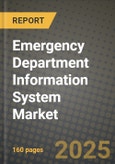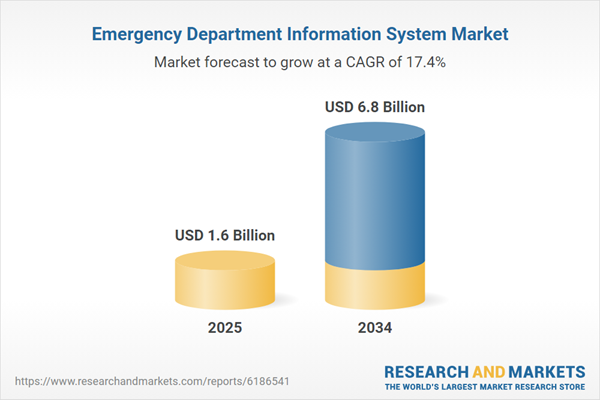The Emergency Department Information System (EDIS) market is witnessing substantial growth as hospitals and healthcare facilities increasingly adopt digital solutions to enhance emergency care operations. EDIS is a specialized software system designed to manage patient flow, streamline clinical workflows, improve communication among healthcare providers, and optimize resource utilization in emergency departments (EDs). With the rising global incidence of emergency cases, including trauma, cardiac events, and infectious diseases, hospitals are prioritizing the implementation of EDIS to ensure faster patient triage, accurate medical documentation, and seamless coordination between emergency teams. Additionally, government mandates for electronic health record (EHR) integration, along with increasing healthcare digitization efforts, are accelerating EDIS adoption. The need for data-driven decision-making and real-time patient monitoring is also fueling demand for advanced EDIS solutions, particularly cloud-based and AI-enabled systems that improve operational efficiency and patient outcomes.
The Emergency Department Information System market is expected to experience significant advancements driven by the increasing integration of artificial intelligence (AI) and predictive analytics in emergency care. AI-powered EDIS solutions are enhancing triage accuracy by analyzing patient data and predicting severity levels, allowing for faster intervention. Additionally, real-time analytics tools are helping healthcare providers optimize bed management, staff allocation, and patient wait times. The growing emphasis on interoperability is leading to improved integration between EDIS and hospital-wide EHR systems, ensuring a seamless exchange of critical patient information. Governments and healthcare organizations are also investing in cybersecurity measures to protect sensitive patient data, as cyber threats targeting hospital IT infrastructure continue to rise. Furthermore, the expansion of telemedicine services is influencing EDIS development, with solutions now incorporating virtual triage and remote patient monitoring capabilities to improve access to emergency care, particularly in underserved areas. The adoption of cloud-based platforms is also on the rise, enabling hospitals to enhance scalability, reduce IT infrastructure costs, and improve system accessibility for emergency care professionals.
The Emergency Department Information System market is set to evolve further, with a strong focus on automation, real-time decision support, and patient-centric care. AI-driven automation will continue to play a crucial role in reducing administrative burdens, automating clinical documentation, and assisting in real-time decision-making for emergency physicians. The adoption of blockchain technology is also expected to gain traction, ensuring enhanced security and transparency in patient data management. Furthermore, the growing use of wearable devices and IoT-based health monitoring solutions will enable real-time data sharing between patients and emergency departments, allowing for proactive medical interventions. As the healthcare sector continues to embrace value-based care models, EDIS solutions will integrate advanced analytics for outcome-based performance tracking and resource optimization. Additionally, regulatory frameworks will become more stringent, driving compliance-focused innovations in EDIS solutions. With continuous technological advancements and increasing investments in healthcare IT, the EDIS market will remain a crucial component in enhancing emergency medical services worldwide.
Key Insights: Emergency Department Information System Market
- AI-Driven Triage and Decision Support: AI-enabled EDIS solutions are transforming emergency care by improving triage accuracy, predicting patient acuity levels, and assisting healthcare providers in making real-time treatment decisions to enhance patient outcomes.
- Increased Interoperability with EHR Systems: The push for seamless healthcare IT integration is driving EDIS vendors to develop highly interoperable systems that facilitate real-time data exchange between emergency departments and hospital-wide electronic health record platforms.
- Rise of Telemedicine and Virtual Triage: The integration of telemedicine features within EDIS is enabling remote patient assessments, virtual triage, and digital consultations, expanding access to emergency medical services, particularly in rural and underserved regions.
- Cloud-Based EDIS Adoption: Hospitals are increasingly shifting to cloud-based EDIS solutions to enhance system scalability, reduce infrastructure costs, and enable real-time access to emergency department data from multiple locations.
- Enhanced Cybersecurity Measures: With the growing threat of cyberattacks on healthcare IT systems, EDIS providers are prioritizing data encryption, multi-factor authentication, and blockchain technology to safeguard patient records and critical emergency care data.
- Rising Emergency Room Visits: The increasing prevalence of chronic diseases, accidents, and infectious disease outbreaks is driving higher emergency room admissions, necessitating efficient EDIS solutions to manage patient flow and enhance emergency care delivery.
- Government Mandates for Healthcare Digitization: Regulatory bodies worldwide are enforcing electronic health record (EHR) adoption and interoperability requirements, pushing hospitals to invest in advanced EDIS solutions for compliance and improved patient care coordination.
- Advancements in AI and Predictive Analytics: The integration of AI-driven analytics into EDIS is enabling real-time decision-making, early risk detection, and optimized resource allocation, improving overall emergency department efficiency.
- Growing Investment in Smart Hospitals: The rise of smart hospitals, equipped with IoT, automation, and digital health technologies, is driving the demand for sophisticated EDIS solutions that support intelligent workflows and real-time patient monitoring.
- High Implementation Costs and IT Infrastructure Challenges: The deployment of EDIS solutions requires significant investment in IT infrastructure, staff training, and system integration, posing financial and operational challenges for smaller hospitals and healthcare facilities.
Emergency Department Information System Market Segmentation
By Software Type
- Enterprise Solutions
- Best Of Breed (B.O.B.) Solutions
By Deployment
- On-Premise Emergency Department Information System
- Software-As-A-Services (SaaS)
By Application
- Computerized Physician Order Entry (CPOE)
- Clinical Documentation
- Patient Tracking and Triage
- E-Prescribing
By End User
- Small Hospitals
- Medium-Sized Hospitals
- Large Hospitals
Key Companies Analysed
- McKesson Corporation
- Optum Inc.
- Siemens Healthineers
- Philips Healthcare
- GE Healthcare
- Cerner Corporation
- Epic Systems Corporation
- Athenahealth Inc.
- Carestream Health
- eClinicalWorks
- Allscripts Healthcare Solutions Inc.
- InterSystems Corporation
- NextGen Healthcare
- CPSI (Computer Programs and Systems Inc.)
- Picis Clinical Solutions
- Medhost Inc.
- QuadraMed
- Medsphere Systems Corporation
- Nextech Systems LLC
- The T System Inc.
- Practice Fusion
- Streamline Health Solutions Inc.
- Greenway Health
- Wellsoft Corporation
- Medical Information Technology Inc.
- Agfa HealthCare
- Infor Healthcare
Emergency Department Information System Market Analytics
The report employs rigorous tools, including Porter’s Five Forces, value chain mapping, and scenario-based modeling, to assess supply-demand dynamics. Cross-sector influences from parent, derived, and substitute markets are evaluated to identify risks and opportunities. Trade and pricing analytics provide an up-to-date view of international flows, including leading exporters, importers, and regional price trends.
Macroeconomic indicators, policy frameworks such as carbon pricing and energy security strategies, and evolving consumer behavior are considered in forecasting scenarios. Recent deal flows, partnerships, and technology innovations are incorporated to assess their impact on future market performance.Emergency Department Information System Market Competitive Intelligence
The competitive landscape is mapped through proprietary frameworks, profiling leading companies with details on business models, product portfolios, financial performance, and strategic initiatives. Key developments such as mergers & acquisitions, technology collaborations, investment inflows, and regional expansions are analyzed for their competitive impact. The report also identifies emerging players and innovative startups contributing to market disruption.
Regional insights highlight the most promising investment destinations, regulatory landscapes, and evolving partnerships across energy and industrial corridors.Countries Covered
- North America - Emergency Department Information System market data and outlook to 2034
- United States
- Canada
- Mexico
- Europe - Emergency Department Information System market data and outlook to 2034
- Germany
- United Kingdom
- France
- Italy
- Spain
- BeNeLux
- Russia
- Sweden
- Asia-Pacific - Emergency Department Information System market data and outlook to 2034
- China
- Japan
- India
- South Korea
- Australia
- Indonesia
- Malaysia
- Vietnam
- Middle East and Africa - Emergency Department Information System market data and outlook to 2034
- Saudi Arabia
- South Africa
- Iran
- UAE
- Egypt
- South and Central America - Emergency Department Information System market data and outlook to 2034
- Brazil
- Argentina
- Chile
- Peru
Research Methodology
This study combines primary inputs from industry experts across the Emergency Department Information System value chain with secondary data from associations, government publications, trade databases, and company disclosures. Proprietary modeling techniques, including data triangulation, statistical correlation, and scenario planning, are applied to deliver reliable market sizing and forecasting.Key Questions Addressed
- What is the current and forecast market size of the Emergency Department Information System industry at global, regional, and country levels?
- Which types, applications, and technologies present the highest growth potential?
- How are supply chains adapting to geopolitical and economic shocks?
- What role do policy frameworks, trade flows, and sustainability targets play in shaping demand?
- Who are the leading players, and how are their strategies evolving in the face of global uncertainty?
- Which regional “hotspots” and customer segments will outpace the market, and what go-to-market and partnership models best support entry and expansion?
- Where are the most investable opportunities - across technology roadmaps, sustainability-linked innovation, and M&A - and what is the best segment to invest over the next 3-5 years?
Your Key Takeaways from the Emergency Department Information System Market Report
- Global Emergency Department Information System market size and growth projections (CAGR), 2024-2034
- Impact of Russia-Ukraine, Israel-Palestine, and Hamas conflicts on Emergency Department Information System trade, costs, and supply chains
- Emergency Department Information System market size, share, and outlook across 5 regions and 27 countries, 2023-2034
- Emergency Department Information System market size, CAGR, and market share of key products, applications, and end-user verticals, 2023-2034
- Short- and long-term Emergency Department Information System market trends, drivers, restraints, and opportunities
- Porter’s Five Forces analysis, technological developments, and Emergency Department Information System supply chain analysis
- Emergency Department Information System trade analysis, Emergency Department Information System market price analysis, and Emergency Department Information System supply/demand dynamics
- Profiles of 5 leading companies - overview, key strategies, financials, and products
- Latest Emergency Department Information System market news and developments
Additional Support
With the purchase of this report, you will receive:- An updated PDF report and an MS Excel data workbook containing all market tables and figures for easy analysis.
- 7-day post-sale analyst support for clarifications and in-scope supplementary data, ensuring the deliverable aligns precisely with your requirements.
- Complimentary report update to incorporate the latest available data and the impact of recent market developments.
This product will be delivered within 1-3 business days.
Table of Contents
Companies Mentioned
- McKesson Corporation
- Optum Inc.
- Siemens Healthineers
- Philips Healthcare
- GE Healthcare
- Cerner Corporation
- Epic Systems Corporation
- Athenahealth Inc.
- Carestream Health
- eClinicalWorks
- Allscripts Healthcare Solutions Inc.
- InterSystems Corporation
- NextGen Healthcare
- CPSI (Computer Programs and Systems Inc.)
- Picis Clinical Solutions
- Medhost Inc.
- QuadraMed
- Medsphere Systems Corporation
- Nextech Systems LLC
- The T System Inc.
- Practice Fusion
- Streamline Health Solutions Inc.
- Greenway Health
- Wellsoft Corporation
- Medical Information Technology Inc.
- Agfa HealthCare
- Infor Healthcare
Table Information
| Report Attribute | Details |
|---|---|
| No. of Pages | 160 |
| Published | October 2025 |
| Forecast Period | 2025 - 2034 |
| Estimated Market Value ( USD | $ 1.6 Billion |
| Forecasted Market Value ( USD | $ 6.8 Billion |
| Compound Annual Growth Rate | 17.4% |
| Regions Covered | Global |
| No. of Companies Mentioned | 27 |









